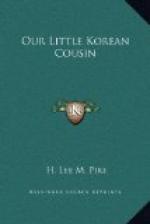“Taijo proved his bravery and his reliance on the soldiers and on the people by attempting to bring about a change in the conduct of the king, who abused his power and treated his subjects without mercy.
“The king, however, refused to listen to the advice of his father-in-law, and, as a consequence, the hatred of the people for him grew in volume and force every day.
“Meanwhile, the king was having other troubles. In former years, Korea had paid an annual tribute or tax to China, but for some time it had been held back by this king. Consequently the Chinese (or Ming) emperor sent a large army to enforce his demand for the amount of money due him.
“The Korean ruler neglected the matter and finally refused to pay. He then ordered that more soldiers be added to his army, that the Chinese forces might be resisted; but with all his efforts the enemy’s army was much the larger. Nevertheless, he ordered Taijo, at the head of his forces, to attack the Chinese. Upon this, Taijo thus addressed his soldiers:
“’Although the order from the king must be obeyed, yet the attack upon the Ming soldiers, with so small an army as ours, is like casting an egg against a rock, and no one of us will return alive. I do not tell you this from any fear of death, but our king is too haughty. He does not heed our advice. He has ordered out the army suddenly without cause, paying no attention to the suffering which wives and children of the soldiers must undergo. This is a thing I cannot bear. Let us go back to the capital, and the responsibility shall fall on my shoulders alone.’
“The soldiers were quite willing to take the advice of their courageous leader, and resolved to obey his orders rather than the king’s. They went to the capital, forcibly removed the king from his throne, and banished him to the island of Kang-wa.
“Not yet, however, was Taijo made king. The deposed ruler plotted and planned all kinds of schemes whereby he might be restored to his old position of authority. Taijo heard of some of his plots, and finally did that which would for ever extinguish the authority of the old king or any of his family. He removed from the temple the tablets on which were inscribed the names of the king’s ancestors. More than this, he ordered that no more sacrifices be offered to them.
“The king could have suffered no greater insult than this, for, like all Koreans, he held as sacred the memory of his ancestors, and even to speak ill of one of them was an unpardonable crime. But this time he was powerless to resent the indignity or to punish the offender, and consequently he lost what little influence he had been able to retain.
“Taijo was now formally proclaimed king. He was able to make peace with the Chinese emperor, and under his rule the Koreans enjoyed freedom from war and oppression. His descendants still sit upon the throne of Korea.”




